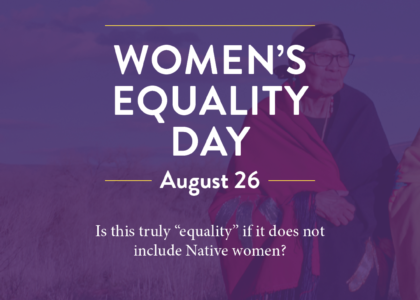August 26 is Women’s Equality Day, in honor of the day in 1920 when women were first guaranteed the right to vote in the United States. But this equality has not always been extended to Native women.
It wasn’t until 1962 when all Native women in the U.S. were guaranteed the right to vote.
A Brief History of Native Women’s Voting Rights in the U.S.
- August 26, 1920: The 19th Amendment passes, prohibiting states to deny women the right to vote. At this time, Native people were not legally considered citizens and could not vote.
- June 2, 1924: President Coolidge signs the Indian Citizenship Act, allowing Native people to vote for the first time.
- 1948: The New Mexico court rules in favor of Miguel Trujillo (Isleta Pueblo), a veteran, whose voter registration application had been denied as the state constitution included the phrase, “Indians not taxed may not vote.”
- 1962: New Mexico is the last state to change its laws, granting all Native people the right to vote.
- 1983: Jeanine Windy Boy Pease and seven other plaintiffs sued Big Horn County in Montana over voter discrimination towards Native voters. “Voting rights impacts every aspect of the lives of Native Americans… These systems won’t be responsive unless we can fully participate in them.” – Jeanine Pease
- 1984: Fall River County, South Dakota rejects Native voters registration applications, including Joe American Horse. The day before the election, the court orders the state to let them vote.
- 2002: Native voters on the Pine Ridge and Rosebud Reservations led to a win for Democratic Senator Tim Johnson by 524 votes.
- June 25, 2013: The Supreme Court repeals voter protections that disproportionately affect Native voters.
- 2020: Native voters in Arizona and Wisconsin swung the presidential election, leading to President Biden’s win. Native voters in those states had a significant impact in their state and local elections as well.
- July 1, 2021: The U.S. Supreme Court decision, Brnovich v. DNC, upheld two Arizona voting policies that make it harder for people of color and Native people to vote.
- August 2021: Rep. Tom Cole (Chickasaw) and Rep. Sharice Davids (Ho-Chunk) introduced the Native American Voting Rights Act (NAVRA) of 2021.
Even once New Mexico changed its laws in 1962, and the Civil Rights Act passed in 1964, many counties and states have maintained and even continue to pass discriminatory voting policies that present many barriers to Native voters.
The strength of the Native vote has been demonstrated time and again. Meaningful participation in government is a part of our legacy as Indigenous peoples.
When we celebrate women’s equality, we need to ensure that Native women are included.
Reach out to your senators and tell them you support the Native American Voting Rights Act (NAVRA).
Find your US State Senators today.
Today, the Native vote in Arizona is currently under attack. Arizona residents, contact Senator Kyrsten Sinema – who would not have won her election without the Native vote – to tell her that NAVRA must be included in any voting rights legislation she’s moving forward.
Sources:
NonDoc – Timeline of Native Voting Rights
High Country News – How Indigenous voters swung the 2020 election
NARF – Supreme Court Decision Fails to Protect Native American Voting Rights
Smithsonian – Make Native votes Count – Janine Windy Boy sued government


